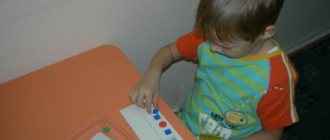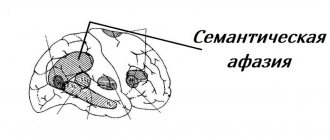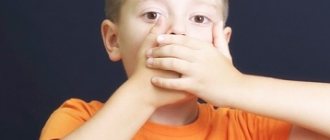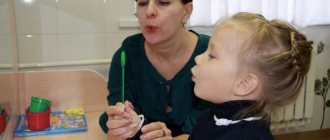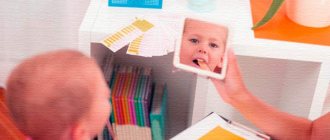The development of speech in humans begins from birth. It is known that by the age of 3-5 years, children acquire the skill of correct pronunciation of all sounds. But with some problems in the development of the nervous system (NS) or certain parts of the brain, a child speaks poorly at 4 years old: he is unable to express a thought, formulate a sentence and give an explanation for his behavior. We will talk about the norms and pathology of speech in such children, as well as methods for correcting incorrect pronunciation of sounds in this article.
Normal speech of a child at 4 years old
This age is called the “why” period. Children actively explore the world around them; many questions arise in their heads, which they tirelessly ask adults.
This is the normal course of a child’s speech development. You can understand where the deviation begins by studying the norm of speech development.
- The little “why” clearly formulates his thoughts and expresses them. Its active dictionary contains about 2,500 words. Gradually, speech is enriched with new words.
- An elementary delimitation of objects by characteristics begins, and a connection can be found between occurring phenomena.
- In between constant questions, the baby can already listen to the answers. Attention becomes more stable.
- Statements consist of simple and complex structures and sentences.
- The child can already tell basic information about himself, briefly retell a fairy tale, or talk about his day in kindergarten.
- Sentences that are grammatically incorrect are allowed, as long as the meaning of the information is preserved. Words have incorrect endings or do not agree with each other.
- The child from the outside sees mistakes in the interlocutor’s speech, but does not yet notice his own.
- Children learn to rhyme words, the first combinations of words appear in rhyme.
- The baby can identify sounds from words, but “l” and “r” are not yet audible. Often at this age he correctly pronounces “sh”, “zh”, “sch”, “ts”, “ch”.
- In speech, sometimes there is a rearrangement of letters, a lack of them in a word (knocked up - ate, hungry - hungry).
Children strive to communicate and are the first to talk to people. The absence of some sounds in speech is allowed. This is also a variant of the norm at 4 years.
Signs of speech delay at the age of 4 years
Signs of RDD at this age are the following:
- the child communicates with a stream of sounds, with intonation, but it is impossible or almost impossible to understand what is being said;
- the child does not show interest in conversation, and when they try to talk to him, he communicates using gestures;
- the child knows very few words (less than 20), does not want to repeat after the parents the word they uttered, or simply runs away during the learning process;
- there is no perception of simple tasks consisting of two actions (for example, “come to the table”, “bring the ball”, “place the cube”, etc.);
- Many words “drop out” from the spoken speech, so it is very difficult to understand the child;
- the child tries to repeat the words of songs from his favorite cartoons or phrases of cartoon characters, but all he gets is a set of sounds.
You can learn more about what ZRD is and how parents can deal with it in this article.
It may also be that at first the baby develops normally, pronounces sounds and syllables, but upon reaching 4 years of age he still does not speak. Therefore, you need to constantly monitor the child’s development.
Speech disorders according to ICD-10
In the International Classification of Diseases, specific speech development disorders are coded F80, R47, F84, F98. These include the following pathologies:
- receptive speech disorder – the child does not understand what is being said to him;
- expressive language disorder - he cannot speak in accordance with his age;
- speech articulation disorder – makes sounds inappropriate for age (1-2 years);
- dysphasia, aphasia – damage to the cerebral cortex, in which speech is impaired or absent;
- dysarthria, anarthria - speech disorders as a result of problems in the innervation of the articulatory apparatus, pathologies of the nervous system;
- autism;
- stuttering and other pathologies.
Causes of slurred or absent speech
We see that there is a wide variety of violations of a child’s communication through speech. There are also many reasons for this.
Recently, speech therapists, psychologists and doctors have been sounding the alarm: more than 60% of four-year-old preschoolers speak and formulate thoughts incorrectly. This problem threatens the current generation in that incorrectly structured communication is followed by erroneous spelling of words and a reduced quality of assimilation of school material. What kind of literacy and academic performance should you dream of then?
There are many reasons for speech development disorders at four years of age:
- Pain in the mother during pregnancy.
- Birth injuries, lack of oxygen, asphyxia.
- Late maturation of brain structures.
- Neuroinfections and TBI (traumatic brain injury) present in early childhood.
- Pathologies at the chromosome level.
- Pedagogical neglect.
- Insufficient communication between the child and parents.
- Excessive “immersion” in gadgets.
- Stress, nervous shock during the period of speech formation.
- Hearing pathologies.
There are statistical data: in 4-year-old boys, speech disorders are diagnosed 4-5 times more often than in girls of the same age.
Parents themselves often become the cause of poor pronunciation of words. They do not create an atmosphere of trust where the child could open up, communicate, share news and experiences. The reason for this is excessive busyness, the desire to occupy the child with a computer or phone in order to relax in silence. In general walks, conversations over tea, communication skills are formed.
Diagnosis by a speech therapist and other specialists
If you suspect a delay in speech and mental development, it is important not to waste time, but to immediately contact a speech therapist. Sometimes, in addition to this specialist, consultations with a psychologist, psychoneurologist, neurologist, or defectologist are required. The specialist conducts differential diagnostics using special methods and tools to determine the exact cause of the underdevelopment of means of communication. Hearing, the integrity of mental processes, articulation, and physiological abnormalities in the speech apparatus are checked.
It is not for nothing that a routine examination by a speech therapist is required at 3 years of age. This is the most favorable age for the most effective correction of speech problems.
The doctor prescribes treatment aimed at restoring the nervous system, hearing, vocal cords and other organs if there is a problem with them. At 3 years old it is still possible to “catch up” with the missed stages of speech development, but then it is more difficult to do this.
Correction methods
If a child speaks poorly at the age of 4, this is a signal of danger for the development of his higher mental functions. A speech therapist helps correct defects in the pronunciation of sounds, expands vocabulary, and develops the skill of composing a story and its design.
The first lesson with a speech therapist is to diagnose the problem, identify organic, functional problems of speech development.
The specialist makes a conclusion and identifies the problem that needs to be corrected with medical means or speech therapy sessions.
In subsequent classes, work is done on the identified defect. The speech therapist uses methods such as articulatory gymnastics, mnemonics, speech therapy massage, development of the phonetic-phonemic side of speech, vocabulary, grammatical structure, improvement of coherent language, and the formation of communication.
A child development specialist knows that at 4 years old a child learns new knowledge through play. Various proprietary techniques are used to correct the game:
- Elkonina;
- Fomicheva;
- Volkova;
- Porridge;
- Tkachenko's technique is used for 4-6 years.
Often a speech therapist is asked to “produce” sounds. This is one of the easiest problems of speech development in children. To solve it, the specialist uses gymnastics, rhymes and other methods.
A prerequisite is the development of articulation.
The work of producing sounds is divided into several stages:
- exercises to develop articulation;
- production of an independent sound, with vowels;
- introduction to speech.
During the “introduction to speech” stage, the help of parents is important. Children need to be shown the correct pronunciation, repeat the words with the problem letter together, go back and ask them to repeat it again if the child said the word incorrectly.
Here are examples of some exercises for developing articulation:
- “Let’s lick our lips.” The parent shows how to lick lips after jam and chocolate. Done in a fun atmosphere.
- “Fold your lips into a tube.” The child should see an example of how this is done. You can figure out how to beat the situation: “we are trains - tu-tu,” “we blow through a straw,” and so on.
- A good exercise about the “tongue”, the children really like it: the tongue is about to go for a walk - stick out your tongue as much as possible;
- he washed his face, combed his hair - move his tongue back and forth between his teeth;
- he looked around at passers-by - circular movements of his tongue across his lips to the left, to the right;
- turned left, right - direct it to the corresponding corners of the mouth;
- fell down, rose up - accordingly, extend longer;
- once, and climbed into the room - hid it sharply in his mouth.
Reviews and comments
You can share your successes in this difficult but very enjoyable task below.
We also recommend that you familiarize yourself with the lessons on rhetoric on our website and the article “Tongue twisters for the development of speech and diction.”
We also recommend reading:
- Storytelling
- Glenn Doman “Harmonious development of the child” - summary
- How to teach a child to read: rules, tips and tricks
- Piaget's theory of cognitive development
- How to teach a child to read English
- Development of communication skills in children
- Exercises for memory development in preschoolers
- How to get your child interested in reading?
- How to teach a child to read quickly and correctly
- How to teach a child to pronounce the sound “R”
- Socialization of personality: briefly about the main thing
Key words:1Children
Prevention and recommendations: memo to parents
What can and cannot be done at home when developing speech in a child?
- It is important to learn to speak to your baby clearly, distinctly and slowly.
- You can’t “little”, because children will definitely repeat the pronunciation defects. This will slow down the absorption of sounds.
- Under no circumstances should you scold for incorrect pronunciation or mimic.
- It is important to teach four-year-old children easy words first, then difficult ones.
- Parents should study at home as the specialist says. At the same time, they show interest, attitude, and calmness. It is important to conduct classes regularly.
- At home, you need to ask “Why?” more often. This is how children learn to form sentences, analyze, and develop an active vocabulary.
- You should talk to your son and daughter more often and have them tell you their favorite cartoons and fairy tales. Write educational stories with your children.
- Make applications: this will delight the baby and will also contribute to the development of fine motor skills. The child learns to work with paper, scissors, glue, and get complete pictures.
- Use a mirror when practicing. Kids are interested in watching their achievements. They continue to study themselves, the movements of their lips and tongue.
- To be motivated to study, encourage your child with praise from relatives and tasty sweets for each achievement in speech development.
It is important to show the child interest in his development. Don't let your mood take over. Babies are sensitive to parental irritation. They become isolated and trust is lost. This indirectly inhibits the process of speech development.
Diagnostics
If a four-year-old child is suspected of having RRD, the first step is to show the child to the local pediatrician. He has all the information about the child, starting from the moment of his birth, so he will be able to determine the preliminary causes of RDD.
Then the pediatrician will refer the child for examination to other specialists:
- The otolaryngologist will examine the child for poor hearing, internal inflammation and enlarged adenoids. All this can affect speech development delays.
- The speech therapist will test the child for the development of his speech therapy and psychomotor skills.
- A visit to a psychologist is also required. The specialist will determine the psycho-emotional state of the child, since very often mental disorders inhibit the speech process. The psychologist will also identify the activity of communication between parents and the child in order to understand how they influence his development.
- The neurologist will conduct diagnostic measures: MRI, echo-encephalogram and electroencephalogram.
